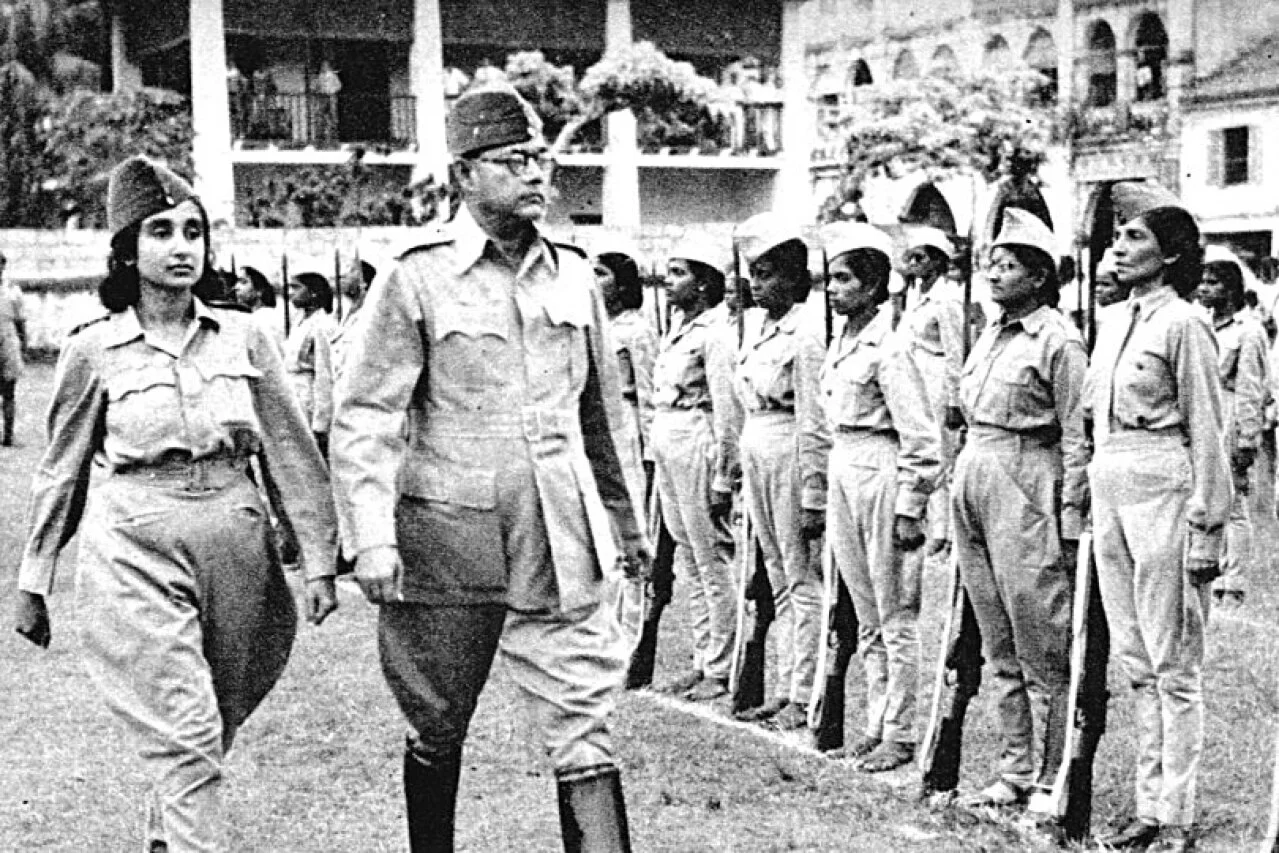Women at War is a book about shared vision—the vision of Indian independence, for which so many men and women were willing to give their lives, a vision which united the charismatic, controversial, and Cambridge-educated Subhas Chandra Bose with the women of the Rani of Jhansi Regiment, many of whom had never even lived in their mother country.
Technological Optimism and the Imagined Future: Implications for Warfare
Simplicity Before Complexity: Conceptualizing Long-Term Military Competitions
Are U.S. goals vis-à-vis opposing powers tied to an identifiable definition of defeating an opponent? Do U.S. goals account for a clear relationship between ends and means, and the finite nature of both? If the answer to any of these questions is no, and if therefore the nature of the competition cannot be coherently explained, then competition has likely passed form reasonable idea to a meaningless buzzword.
#Reviewing Aiding and Abetting
Understanding how foreign assistance might enable state actors to maintain power in ways that violate the values America espouses in its national policy documents is key to understanding the nature of power in a recipient state. As such, the United States could better tailor such assistance in local contexts that serve the people who need it most while at the same time achieving its strategic objectives.
Who was Sun Tzu’s Napoleon?
We know that Thucydides was not only the chronicler, but a general in the Peloponnesian War, Julius Caesar the architect of the Gallic War, and Machiavelli an active participant in Florentine diplomatic and martial affairs. Maurice de Saxe waded through the bloody fields of Malplaquet and Fontenoy, while both Jomini and Clausewitz kept their own formative experiences fighting in the Napoleonic Wars firmly in mind as they composed their respective theoretical works. But what motivated Sun Tzu (or its anonymous authors) to compose The Art of War? What were its historical precedents?
Crossroads Afghanistan: Alternatives to a Forlorn Deal
Since 2001, the American objective of denying safe haven to terrorists has hinged on the need for a stable Afghan state capable of permanently countering such threats. This objective has been complicated by the Taliban-led insurgency, which has allied and integrated with transnational terror organizations. Frustrated with open-ended international commitments, the Trump administration has pinned its Afghanistan policy on military withdrawal and expeditious negotiations with the Taliban.
Whose National Interest? Which Foreign Policy?
The role of political leaders is to assess the international situation and to capitalize on those interventions where discrete interests are intertwined and avoid actions which would undermine strategic priorities. In certain instances, spreading ideological influence may have a long-term effect on protecting allies or protecting domestic sovereignty from foreign intervention just as protecting an oppressed population or saving one from genocide can go a long way in creating future allies and partners.
#Reviewing Winning Westeros
Winning Westeros is fun for Game of Thrones fans but mixed with regard to its substance. Mostly, though, the book is a testament to the story-telling gifts of George R.R. Martin, who managed to write a series of fantasy novels about dragons and zombies that enthralled a large number of serious people.
Why Maximum Pressure Fails, but Coercive De-escalation Can Succeed
Not Another Peloponnesian War: Great Power Collaboration?
As Thucydides showed so clearly, the real trap is power itself. Insufficient power leaves one open to being exploited, or worse; more power actually makes power harder to control, and it leaves one vulnerable to being undermined. That is the nature of power. Thucydides was right about fear, honour, and interest being the motivators for power.
Turning Battlefield Victory Into Strategic Success: #Reviewing War and the Art of Governance
From Blind Cyclops to Well-Tuned Machine: #Reviewing Spying for Wellington
This detailed study of the intelligence function will prove especially useful to those studying the conduct of intelligence operations throughout the era, whether on the Iberian Peninsula or elsewhere. Davies has also added to the body of knowledge about the Duke of Wellington himself. We get a better appreciation for how Wellington balanced the collected intelligence with his own senses to reach the decisions that propelled him to defeat the French forces in Iberia, and then again with Prussian assistance at Waterloo. Overall, Huw Davies has made an important contribution to the historiography of the Napoleonic field.
Choosing Interests While You Sleep? #Reviewing The Senkaku Paradox
If the U.S. should concede ground on partner territories or interests, the nation must articulate a new policy. The other option would be to compete against near-peer competitors in such a manner that maintains the present security environment with enough flexibility to deter conflict and, if needed, limit escalation. Either way, we must move forward into the reality of great power competition with our eyes wide open and with a determined gait, not dozing and stumbling forward.
Institutional Operating Codes: #Reviewing The Culture of Military Organizations
Retired U.S. Army General David Petraeus observed that “culture, once formed, is difficult to change; it cannot always be ‘tamed’ but it can and should be understood.” Those responsible for strategic leadership and for preparing their military for the future, must understand how culture impacts the effectiveness of an armed force. This is particularly relevant since most officials today describe the strategic environment as an age of disruptive technological change. Professors Mansoor and Murray offer a superlative foundation for reflecting on how to change the odds of gaining that transformation short of the carnage of a world war.
#Reviewing Why America Loses Wars
Stoker’s work is essential reading because it forces us to engage with what it really means for a war to be limited. He also pointedly warns the reader that potential opponents understand limited war better than the U.S. does, although he does not definitively prove this claim. But the work is also frustrating. The question of why the U.S. does not win wars is complex. Simply waging wars more decisively is not enough.
Feedback Driven Decisions and the Evolution of Intelligence Analysis in the United States
The intelligence community’s analytic product dissemination needs to move to a more transactional framework. Accumulated consumer feedback delivered back to the producer would result in more rapid changes from the community, improve the client’s decision-making, and elevate the national security impact of both producers and consumers.
#Reviewing Subordinating Intelligence
Oakley presents a detailed critical assessment of an understudied area of intelligence policy. It is a deep dive into the politics of intelligence reorganization that assumes knowledge of the subject and not one for beginners. Reaching a full judgement of the merits of Oakley’s argument requires delving into topics which provide the political context within which the subordination of intelligence took place but which he does not provide a framing conceptual contest. Among these are the broader debate on the purposes of American foreign policy: the key threats it confronts and the strategies used to meet them; the constantly changing dynamics of the trilateral relationship of Congress, the President, and the intelligence community; and bureaucratic politics. Looking to the future one could add to this list the increased level of political activism being exhibited of intelligence officers following the 2016 presidential election and the growth of populism in the United States.
Reflections on Being a Major
The transition from company grade to field grade officer is unique, and probably one of the hardest transitions in the career of a military officer. As a company grade officer, most development is internally focused. Young officers spend much of their time learning officership through the study of manuals, orders, and directives, all the while in search of their own leadership style. The switch to field grade requires officers to make a 180-degree turn from self-development to subordinate development. The internal focus shifts to external through mentorship and teaching.
Artificial Intelligence and the Manufacturing of Reality
Humans are and have always been vulnerable to being tricked, provoked, conditioned, deceived, or otherwise manipulated. Since at least the 1960s, the Soviet military and subsequent Russian organizations recognized opportunities for exploiting this vulnerability. That is why the Soviets developed a formal research program—called reflexive control theory—to model how one could manipulate targets’ perceptions of reality…While the Russians weaponized reflexive control theory, Madison Avenue used similar logic to evoke emotion—and sell products to American consumers…The contemporary information environment and modern tools, including artificial intelligence, could slash the transaction costs of such manipulation.
Wargaming Contested Narratives in an Age of Bewilderment
In our hyper-connected world, it is not only great powers but also a wide range of activists, extremists, and many others manipulating the information environment and employing powerful narratives to achieve strategic ends. There is a new premium on influence, and it is this “mysterious glue” of stories that has enabled mass cooperation networks since the beginning of our human species.





















